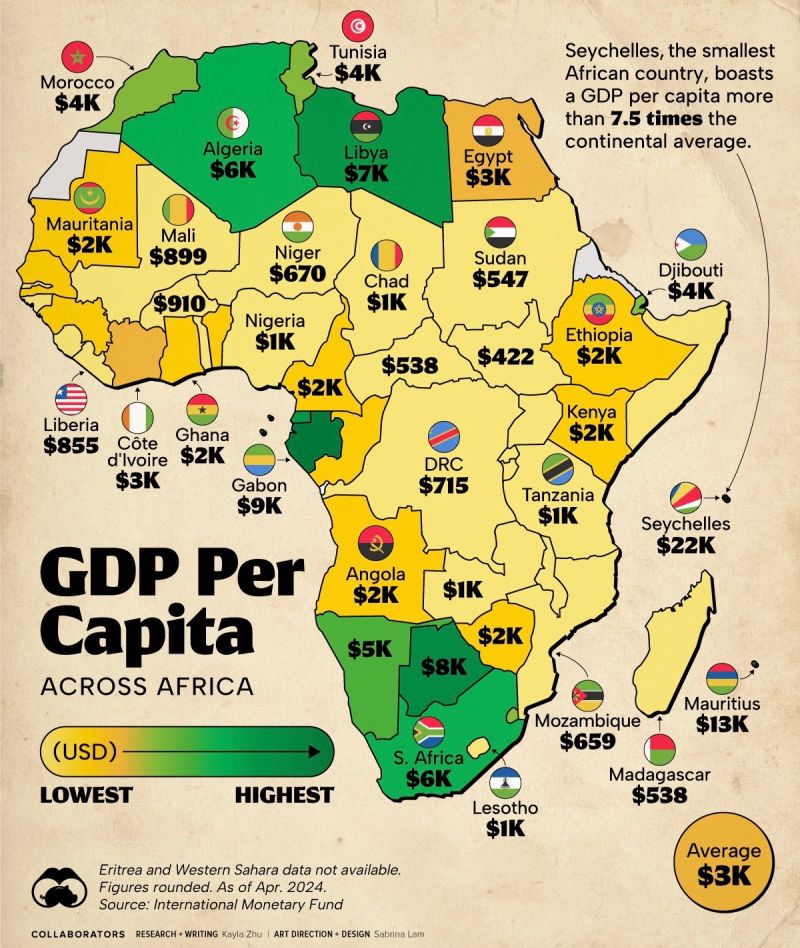-
AutorPublicaciones
-
-
Economic Landscape
of Africa: A
Comprehensive
Analysis of GDP per
Capita by Country
in 2024:

Abstract
Africa has long been considered a region of significant economic potential, with diverse resources, burgeoning industries, and rapidly developing markets. In recent decades, many African nations have witnessed steady economic growth, fueled by advancements in sectors such as oil and gas, mining, telecommunications, and tourism. Despite these strides, Africa’s average GDP per capita remains significantly lower than the global average. This paper analyzes the economic disparities across African countries in 2024, based on GDP per capita, and explores the factors driving growth, challenges faced, and the outlook for the continent’s economic future.
Introduction
In 2024, Africa’s GDP per capita data, as sourced from the International Monetary Fund (IMF), highlights a region of economic contrasts. While some nations exhibit considerable wealth and economic output, others struggle with economic stagnation and widespread poverty. The continent’s average GDP per capita stands at $2,955, significantly lower than the global average of $13,840. Despite this, Africa remains home to some of the world’s fastest-growing economies, particularly in the Sub-Saharan Africa region, which accounts for half of the world’s top 20 fastest-growing nations.
This article provides an in-depth analysis of the GDP per capita by country in Africa for 2024, illustrating the stark differences between nations and investigating the underlying drivers of these disparities. It will also examine the future economic outlook for the continent and explore key sectors contributing to growth.
Africa’s Economic Landscape in 2024
A significant portion of the continent’s economic growth can be attributed to resource-rich countries that have leveraged their natural wealth to propel their economies forward. The oil and gas sector, mining industries, and the telecommunications boom have been particularly important. However, while these sectors have driven growth in countries like Nigeria, South Africa, and Angola, they have also contributed to widening income inequalities within the region.
Among African nations, Seychelles stands out with the highest GDP per capita at $21,875, far surpassing the continental average and positioning itself as a regional leader in economic terms. This small island nation has benefited from its lucrative tourism industry, particularly luxury tourism, contributing to its economic affluence. Following Seychelles is Mauritius, another island nation with a well-established tourism sector, which has a GDP per capita of $12,973, over six times the African average.
Other notable economies in the region include Gabon, Botswana, Libya, and Equatorial Guinea, which, though not as affluent as Seychelles or Mauritius, still demonstrate higher-than-average GDP per capita figures due to diverse economic portfolios, including oil, mining, and services.
In contrast, the continent remains home to nations with low GDP per capita, particularly those in conflict zones, or those with limited access to key industries. Sixteen African countries have a GDP per capita under $1,000, with seven nations recording figures under $600. These nations typically face significant challenges such as poor infrastructure, limited industrialization, political instability, and reliance on subsistence agriculture.
Factors Driving Disparities in GDP per Capita
Several factors contribute to the disparities in GDP per capita across African countries. These include the following:
- Natural Resources: Nations like Libya, Angola, and Equatorial Guinea have benefited immensely from oil exports, leading to higher GDP per capita. However, these economies often face challenges related to resource dependence and the volatility of commodity prices.
- Tourism: Island nations like Seychelles and Mauritius have leveraged tourism as a cornerstone of their economies, which has contributed to their higher GDP per capita. The luxury tourism sector, in particular, has been crucial for these nations’ economic success.
- Infrastructure and Connectivity: Countries with robust infrastructure, such as South Africa and Egypt, tend to have higher GDP per capita figures. Conversely, nations with inadequate infrastructure suffer from lower economic output and reduced potential for growth.
- Political Stability: Political instability has hindered economic development in many African nations. Countries like Libya and Sudan, which have experienced political turmoil, struggle with economic growth due to disrupted governance and the lack of investor confidence.
- Human Capital Development: Education and health play crucial roles in driving economic growth. Countries that have invested in improving human capital, such as Botswana and Mauritius, tend to have higher GDP per capita, as a skilled and healthy workforce is essential for sustained economic development.
The Impact of Economic Disparities
The vast differences in GDP per capita across the continent have serious implications for the social and political landscape of Africa. High disparities contribute to rising inequality, limiting access to healthcare, education, and other vital services. In countries with low GDP per capita, widespread poverty, unemployment, and lack of opportunity exacerbate social tensions and hinder long-term development.
On the other hand, countries with higher GDP per capita tend to enjoy better standards of living, more robust social safety nets, and increased foreign investment. This discrepancy fuels migration trends as people from low-income nations seek better opportunities in wealthier African nations or abroad.
The Future Outlook: Challenges and Opportunities
Despite the challenges, the future of Africa’s economic growth remains promising. The continent is home to several key trends that could reshape its economic landscape in the coming decades:
- Regional Integration: The African Continental Free Trade Area (AfCFTA), established in 2021, has the potential to significantly boost intra-African trade, reduce tariffs, and create a more unified market. This could drive growth and help close the gap between rich and poor countries.
- Technological Advancements: The rise of the digital economy presents immense opportunities for African countries to leapfrog traditional industries. Mobile money, e-commerce, and digital banking are becoming increasingly important, particularly in Sub-Saharan Africa.
- Sustainability and Green Growth: Africa’s vast natural resources and growing interest in renewable energy offer pathways for sustainable development. As global demand for clean energy rises, African nations rich in solar, wind, and hydro resources can become key players in the global energy transition.
- Human Development: Investment in education, healthcare, and infrastructure is critical to improving living standards across the continent. Countries that prioritize these sectors, such as Botswana and Mauritius, have demonstrated that economic growth can be accompanied by improvements in human development.
Conclusion
In 2024, Africa’s GDP per capita reflects a region of significant contrasts, with some nations experiencing rapid growth driven by natural resources, tourism, and industry, while others face challenges stemming from poverty, instability, and limited access to economic opportunities. While Africa’s average GDP per capita remains low compared to the global average, the continent’s potential for growth and development is undeniable. By embracing regional integration, technological innovation, and sustainable practices, Africa can harness its diverse resources to propel its economies forward and close the economic divide between its nations. The future of Africa’s economic landscape will depend on the continent’s ability to tackle its disparities, invest in human capital, and foster policies that promote inclusive growth.
Keywords: Africa, GDP per capita, economic growth, natural resources, tourism, Sub-Saharan Africa, AfCFTA, technological advancements, sustainability, human capital, income inequality.
-
Gross Domestic Product (GDP) per capita is often a misleading metric when evaluating a nation’s wealth and its distribution. For instance, countries like Libya and Algeria may exhibit relatively high GDP per capita figures due to their oil and gas production; however, this does not accurately reflect widespread prosperity. Instead, such wealth is frequently concentrated in the hands of a few, highlighting the inadequacy of GDP per capita as an indicator of equitable wealth distribution.
This issue underscores the need for a re-evaluation of how Africa is perceived and analyzed. Relying on misleading statistics can obscure the real challenges faced by its populations. To truly attract investment, the focus should shift towards infrastructure development that benefits entire communities and promotes equitable growth. Targeted investments in sectors that alleviate poverty and enhance living standards are essential.
-
-
AutorPublicaciones
Debes iniciar sesión para responder a este tema.









